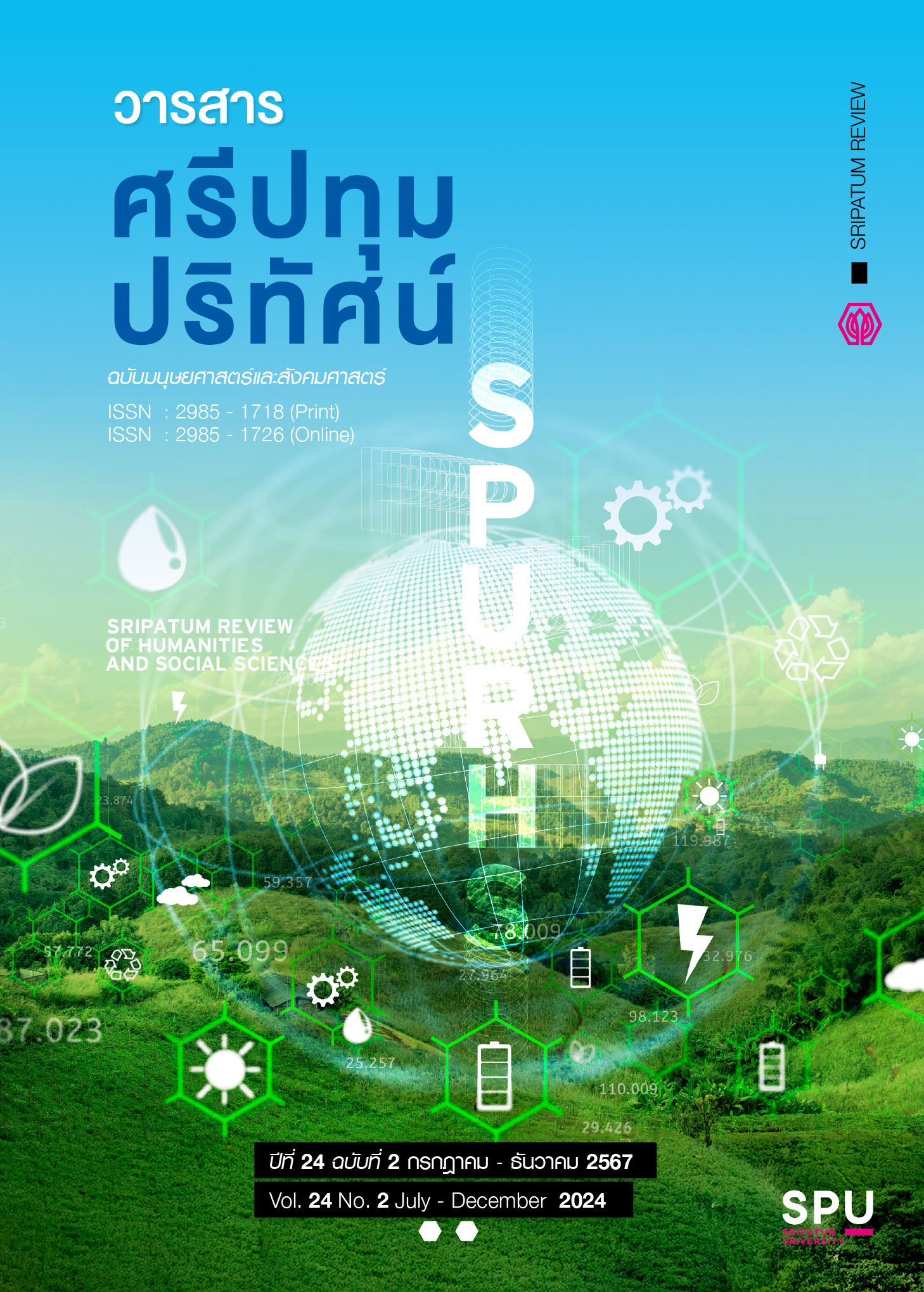The Development of Science Communication Skills and Learning Outcomes Using Predict-Observe-Explain (Poe) Learning Management Combined with Experiential Learning in Science Subjects of Students in Mathayom Suksa 1
Main Article Content
Abstract
The objectives of this research were: 1) to design a Predict-Observe-Explain (POE) learning management system combined with an experiential learning management system, 2) to compare the scientific communication skills of Mathayom Suksa 1 students after receiving Predict-Observe-Explain (POE) learning management combined with experiential learning management, and compared to the criteria of 70 percent, and 3) to compare the learning outcomes of Mathayom Suksa 1 students on the subject of pure substances before and after receiving the Predict-Observe-Explain (POE) learning management combined with the experiential learning management. The tools used in the research included 1) a Prediction-Observe-Explain (POE) learning management plan combined with 5 experiential learning plans, 2) a scientific communication skills test in speaking and writing, and 3) Science Learning Outcome Measurement: The sample group was Matthayom Suksa 1/1 students, semester 1, academic year 2024, in a large extra-large secondary school size, Samut Songkhram Province with a total of 30 students, using Simple Random Sampling by drawing lots (Lottery). Statistics used to analyze the data included mean, standard deviation, and t-test.
The research results found that: 1) Result of the Predict-Observe-Explain (POE) learning management design combined with experiential learning management consisting of 5 steps: 1) Interest building step, 2) Experience creation step combined with Prediction, Observe, Explain (POE), 3) reflection stage, 4) summary stage, and 5) application stage. 2) Result of the study of science communication skills of Mathayom Suksa 1 student after receiving the Predict-Observe-Explain (POE) learning management and the experiential learning management compared to the 70 percent criterion, it was found that higher than the specified criteria 70 percent with statistically significant at a level of .01. 3) Result of comparing the learning outcomes of Mathayom Suksa 1 students on pure substances after receiving the Predict-Observe-Explain (POE) learning management combined with experiential learning management was higher than before studying with statistically significant at a level of .01.
Article Details

This work is licensed under a Creative Commons Attribution-NonCommercial-NoDerivatives 4.0 International License.
1. กองบรรณาธิการสงวนสิทธิ์ในการพิจารณาและตัดสินการตีพิมพ์บทความในวารสาร
2. บทความทุกเรื่องจะได้รับการตรวจสอบทางวิชาการโดยผู้ทรงคุณวุฒิ แต่ข้อความและเนื้อหาในบทความที่ตีพิมพ์เป็นความรับผิดชอบของผู้เขียนแต่เพียงผู้เดียว มิใช่ความคิดเห็นและความรับผิดชอบของมหาวิทยาลัยศรีปทุม
3. การคัดลอกอ้างอิงต้องดำเนินการตามการปฏิบัติในหมู่นักวิชาการโดยทั่วไป และสอดคล้องกับกฎหมายที่เกี่ยวข้อง
References
Boonna, A. (2022). The development of imaginative and creative story writing by using experiential learning with creative storyline writing technique for grade 6 students. Independent Study of the Master of Education degree. Phitsanulok: Naresuan University. (in Thai)
Buakieow, P. (2022). Using experiential learning approach and mathematical tasks to enhance mathematical connection ability of grade 9 students in similarity. Independent Study of the Master of Education degree. Phitsanulok: Naresuan University. (in Thai)
Chesimet, M. C., Githua, B. N. & Ng’eno, J. K. (2016). Effects of Experiential Learning Approach on Students' Mathematical Creativity among Secondary School Students of Kericho East Sub-County, Kenya. Journal of Education and Practice, 7(23), 51-57.
Haputon, K., Porntrai, S. & Saenna, P. (2023). Difficulties with science communication of high school students and promoting science communication self-efficacy using science communication-oriented learning management. Journal of Education Naresuan University, 25(3), 194-207. (in Thai)
Ministry of Education. (2017). Indicators and Core Learning Content Science Learning Group (Edition Revised in 2017) According to the Basic Education Core Curriculum, B.E. 2008. Bangkok: The Agricultural Co-Operative Federation of Thailand Press, Ltd. (in Thai)
Nuntachompoo, P. (2021). Development problem-based learning for approach for increasing scientific communication and collaboration skills about living things for grade v students. Independent Study of the Master of Education degree. Phitsanulok: Naresuan University. (in Thai)
Ponglunhit, J. (2017). The effects of using experiential learning management on mathematical problem solving skills and connection skills of Mathayomsuksa 3 students. Thesis of the Master of Education degree. Chonburi: Burapha University. (in Thai)
Sinlapachai, N. (2017). A study of learning achievement, science communication skills and teamwork skills on structure and function of angiosperms using 5E learning cycle and cooperative learning jigsaw I technique for eleventh grade students. Thesis of the Master of Education degree. Chonburi: Burapha University. (in Thai)
Tarita, A. (2017). Effect of brain-based learning with predict-observe-explain strategy on science achievement, science process skills, and instructional satisfaction of grade 6 students. Thesis of the Master of Education degree. Songkhla: Prince of Songkla University. (in Thai)
The Institute for the Promotion of Teaching Science and Technology. (2566). Press conference on PISA 2022 assessment results. [Online]. Retrieved from: https://pisathailand. ipst.ac.th/news-21/
Vorakamin, S. (2022). Development of learning achievement and teamwork competency using activity - based learning management in mathematics for grade 4 students. Thesis of the Master of Education degree. Bangkok: Dhurakij Pundit University. (in Thai)
White, R. T and Gunstone, R. F. (1992). Probing Understanding. London: Falmer Press.
Yaemsawai, C. (2023). The development of physics learning innovation through augmented reality (AR) using Predict-Observe-Explain (POE) method to enhance analytical thinking kills on mechanical energy of grade 10. Thesis of the Master of Education degree. Yala: Yala Rajabhat University. (in Thai)


